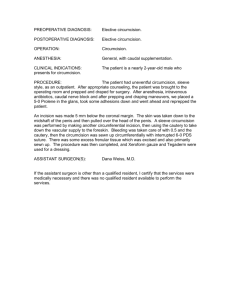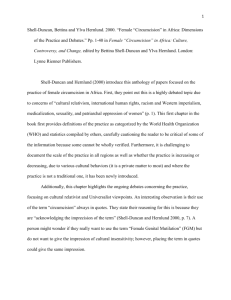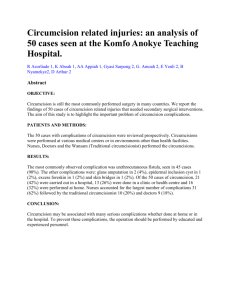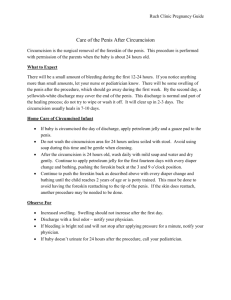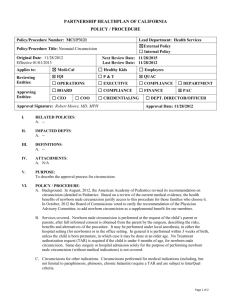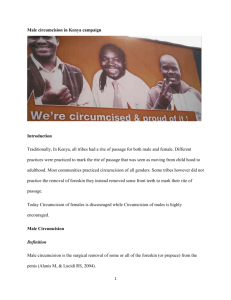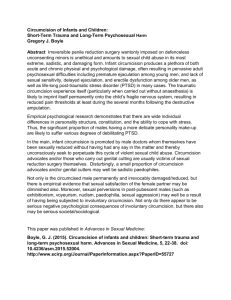Should Circumcision Be Done for Health Reasons?
advertisement
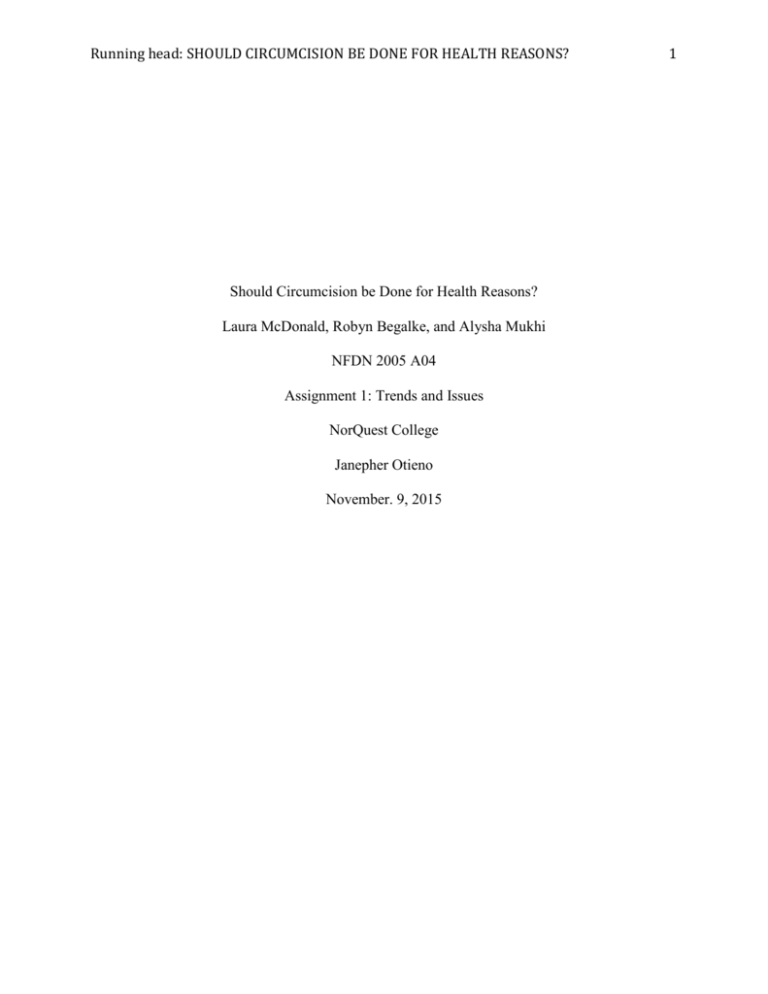
Running head: SHOULD CIRCUMCISION BE DONE FOR HEALTH REASONS? Should Circumcision be Done for Health Reasons? Laura McDonald, Robyn Begalke, and Alysha Mukhi NFDN 2005 A04 Assignment 1: Trends and Issues NorQuest College Janepher Otieno November. 9, 2015 1 SHOULD CIRCUMCISION BE DONE FOR HEALTH REASONS? 2 Should Circumcision be Done for Health Reasons? What is circumcision? Circumcision is “the surgical removal of the foreskin of the penis” (Pilitteri, p. 481, 2014). This procedure is performed primarily for religious reasons and the belief that there are not only health benefits but reduced health risks. Although there is limited opposition to circumcision for religious reasons, there has been a lack of consensus in regards to whether the procedure should be performed for health reasons. It is the responsibility of the parents to determine whether or not they wish for their child to be circumcised, and the responsibility of the health care provider to provide adequate education about circumcision so the parents can make an informed decision. In the past, circumcision was performed routinely at birth. In recent years, circumcision has become a private elective surgery that has to be performed by a specialist, and is not covered by Alberta Health Services. If the caregivers elect to get their male infant circumcised, they will have to make an appointment with a circumcision clinic or a general practitioner that performs the procedure and pay for it out of pocket. The procedure “typically costs $200-500” (Globe and Mail, 2015). Depending on the family’s financial status, this can be a determining factor in the decision making process. However, the most important factor is the impact the decision to circumcise or not will have on the child. How does this impact the children? Circumcision is “best performed during the first or second day of life” (Pilitteri, p. 481, 2014). It is impossible to know what kind of lasting effects this procedure can have on the child’s psyche, when performed so early in life. “The procedure, when it is performed on newborn males and young boys, is inflicted on boy children without their consent” (DeLaet, p. 412, 2009). The child is not able to choose for himself if he would like the procedure to be performed. If the child SHOULD CIRCUMCISION BE DONE FOR HEALTH REASONS? 3 decides later in life that he would have preferred to be uncircumcised and is, or circumcised and isn’t, it may cause psychological harm. When a child acknowledges that their caregiver made the decision, they could develop resentment towards their decision because they may feel violated. However, it is not uncommon for males to choose to become circumcised later in life. During school age years; some boys might feel different from others if their penis’ look different, or look different from their male parent. This may cause damage to the boy’s self image and selfesteem. What are the benefits? There are many benefits associated with circumcision. There is evidence that circumcision can reduce the risk of contracting STI’s (HIV, HPV) and cancer (Pillitteri, 2004). Another benefit to circumcising an infant is that it provides the opportunity for a thorough assessment of the penis and any congenital anomalies can be detected, and corrected at this time. There are many congenital penile anomalies that can affect males and infancy would be the best time to address it (Yesildag, 2015). Being uncircumcised can cause males to experience problems with hygiene because it may be difficult for them to pull their foreskin back when cleansing themselves, or they may not take the time to do so. “Secretions capable of harbouring microorganisms collect underneath foreskin” (Potter & Perry, 2014, p. 847). Poor hygiene in the perineal area can cause infection and may affect intimate relationships later in life. What are the risks? Complications that can arise from infant circumcision are bleeding, infection and formation of a urethral fistula (Pillitteri, 2004). It is ill-advised to put our infants at risk for a procedure that may one day reduce the likelihood that they will contract HIV and may reduce the risk of cancer. Living in Canada, our males are already at a greatly reduced risk of contracting SHOULD CIRCUMCISION BE DONE FOR HEALTH REASONS? 4 HIV. “It is estimated that approximately 71,300 people were living with HIV infection in Canada at the end of 2011” (HIV in Canada, 2015). That is 0.2% of the Canadian population of an estimated 35.7 million (Canada Population 2015, 2015). When an infant is circumcised, there can be substantial pain during the procedure and discomfort for the duration of the healing process. The healing process lasts about four to seven days which can be physiologically stressful to a newborn (Circumcision Edmonton, 2015). The incision needs to remain sterile to reduce the risk of infection. “Newborns should be checked frequently for evidence of swelling, oozing, excessive bleeding, and the ability to void” (Potter & Perry, p. 332, 2014), which can be additional stress to the caregiver. What should be done? After considering the advantages and disadvantages of circumcision, we have concluded that the child should make the choice. It is important for children to feel that they aren’t different from the majority when they reach school age. At this time they will start to be affected by body image insecurity. When they have the capacity to understand the implications, they can make an informed decision. At this time the child can express their concerns and talk to their caregivers. It is becoming more common for parents to not circumcise their child for many reasons. Although there are many benefits such as HIV prevention, prevention of cancer and improved hygiene, there are also risks that are associated. In our opinion, the benefits do not outweigh the risks. The foreskin of a male infant’s penis is healthy and functional tissue. Circumcision is an unnecessary and painful procedure that has the potential to cause undo harm. To remove a part of an infant's body as a prophylactic measure for any reason other than imminent danger is not adhering to the standards we hold ourselves to as health care SHOULD CIRCUMCISION BE DONE FOR HEALTH REASONS? 5 practitioners. With education about proper hygiene practice and safe sexual practices there is no reason to put an infant through a painful surgical procedure. What are the Health Recommendations? Most parents understand the necessity to be informed with regard to the care of a newborn. If circumcision is new to parents they may not be aware of their knowledge deficits. “Promoting freedom of choice in your practice takes some thought and effort. Keeping up with the recent evidence-based research and locating current resources for your clients is important” (Young, p. 22, 2003). As a healthcare worker it is our responsibility to provide education to the parents and address any questions and concerns. The focus of the education will be on the risks and benefits of circumcision, details of the procedure, the healing process, and care before and after. Health care workers should also provide other resources that are available in their community to allow caregivers to explore other learning opportunities. The caregivers can make an informed decision after they gather information and weigh the pros and cons. What are the community resources for caregivers faced with the decision? How is it dealt with, and is it effective? There are many resources for parents to educate themselves about circumcision. Talking to a family physician is the best way to start. He/She can provide more specific information related to the child. Another resource for parents in Canada would be www.caringforkids.cps.ca, on this website parents can find multiple articles which provide additional information that can help them make a choice. Circumcision in Edmonton is addressed through the healthcare team, whether it be a nurse or physician. There are also online resources in Edmonton directed towards parents to help address the issue of circumcision. www.circumcisionedmonton.ca is an online resource that gives parents information about the advantages and disadvantages of circumcision, SHOULD CIRCUMCISION BE DONE FOR HEALTH REASONS? 6 pre and post circumcision surgery care, frequently asked questions, possible complications, as well as a video on multiple methods of circumcision surgery. As a group, we believe the issue of circumcision is being dealt with effectively, there are many available resources throughout the city where parents can get information relating to circumcision to be able to make an informed decision for their child. Conclusion Circumcision is arguably the most controversial topic when it comes to elective surgery with infants. There are advantages as well as disadvantages pertaining to either choice. Ultimately it’s the parents choice on whether or not to perform circumcision surgery. There are many factors to consider before proceeding with circumcision such as how it may affect the child now and in the future. There are also many resources to help caregivers find more information about circumcision and and as part of the health care team, we must provide them with the educational resources to help make the decision. SHOULD CIRCUMCISION BE DONE FOR HEALTH REASONS? 7 References DeLaet, D. L. (2009). Framing Male Circumcision as a Human Rights Issue? Contributions to the Debate Over the Universality of Human Rights. Journal Of Human Rights, 8(4), 405-426. doi:10.1080/14754830903324795 Pillitteri, A. (2014). Maternal & child health nursing: Care of the childbearing & childrearing family (7th ed.). Philadelphia, PA: Lippincott Williams & Wilkins Potter, P., & Perry, A. (2013). In J. Ross-Kerr, M. Wood, B. Astle, & W. Duggleby (Eds.), Canadian fundamentals of nursing (5th ed.). Toronto, ON: Elsevier Canada. Yesildag, E. (2015). It is not "Just Circumcision". Pakistan Journal Of Medical Sciences, 31(4), 1-5. doi:10.12669/pjms.314.7689 Circumcision Edmonton, 2015, Frequently Asked Questions, retrieved from http://www.circumcisionedmonton.ca/~circumci/circumcision-faq#faq1 Government of Canada, 2015, HIV in Canada, retreived from http://healthycanadians.gc.ca/diseasesconditions-maladies-affections/disease-maladie/hiv-vih-eng.php) World Population Review, 2015. Canada Population 2015. Retreived from http://worldpopulationreview.com/countries/canada-population/ Globe and Mail, 2015. Circumcision: 5 facts and 3 misconceptions to consider before you do it. Retrieved from http://www.theglobeandmail.com/life/health-and-fitness/ask-a-healthexpert/circumcision-5-facts-and-3-misconceptions-to-consider-before-you-do-it/article9461671/ Young, H. (2003). Freedom of choice in your practice. International Journal Of Childbirth Education, 18(1), 21-23 3p.
